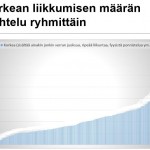We have used several different instruments in our data collection. Several of them we have produced by ourselves (the observation instrument includes involvement scale developed by Laevers 1994). According to the principles of open access we provide them for viewing for the research community. However, the copyright of the instruments belongs to Orientation project, which is directed by Jyrki Reunamo. If you are interested to use the instruments in your research, please contact Jyrki Reunamo at the University of Helsinki.
In addition to the instruments described above, we have used tests for reading and writing readiness, math skills, creativity, balance skills, motor skills, stress level testing (cortisol and alpha amylasis) and physical activity monitoring with Polar activity monitors. The original instruments of Observation and Child Evaluation were developed in 1997 (see Reunamo 2007). They were further developed with the help of the Taiwanese team (especially Hui-Chun Lee, Li-Chen Wang and Rosalind Wu, see https://blogs.helsinki.fi/orientate/taiwanese-team/). The original learning environment was developed in 2004 based on the City of Helsinki data (thank to Seppo Sarras) and enhanced during several rounds of quality evaluation with the help of the municipality participants (especially Merja Kivistö, Helena Nurmi, Taija Pölkki, Heli Söderqvist, Kati Timo, Merja Hietala, Marita Käyhkö, Petra Salomaa and Vesa Joronen) between years 2010-2015. The Leadership evaluation was developed in 2014 with the help of Marja-Liisa Akselin and Ulla Soukainen (thank you for Timo Järvensivu).

